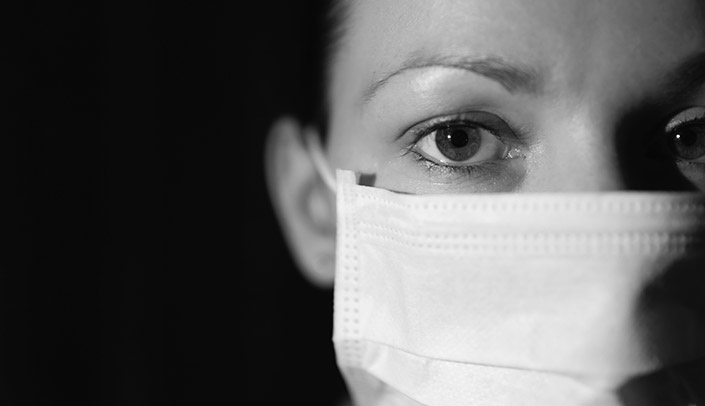Beginning Monday, Sept. 26, UNMC is updating its COVID-19 guidance in response to several weeks of lower COVID-19 risk levels across the state, fewer employees and students reporting COVID-19 infections and the availability of COVID-19 bivalent boosters.
While the COVID-19 challenges are not over, current data allows UNMC to take a step forward to ease its COVID-19 safety precautions across its rural and urban campuses. UNMC leaders will continue to monitor local case counts and modify its guidance as needed.
What’s changing:
- Masking is recommended but optional in non-clinical settings, including research and administration areas, on UNMC campuses (including, but not limited to, classrooms, cubicles, conference rooms, study rooms, breakrooms, hallways, elevators and other common areas).
- Masking is strongly recommended when performing research procedures that require two or more people to be in close contact for prolonged periods of time.
- Masking will still be required for some clinical simulation and training experiences.
- Masking and social distancing are recommended but optional for UNMC gatherings. Safety event plans for gatherings are no longer required.
- In non-clinical settings on UNMC campuses, masking is strongly recommended for visitors, vendors and individuals with an approved exemption to the vaccine policy.
What’s not changing:
- Masks will continue to be required for all students, staff, faculty, visitors, vendors and individuals with an approved exemption to the vaccine policy in buildings and spaces that include patient care areas and in common areas accessed by patients. Buildings with patient care areas include but are not limited to the Munroe-Meyer Institute, the Fred & Pamela Buffett Cancer Center, Lied Transplant Center, Poynter Hall, Durham Outpatient Center, University and Clarkson Towers and UNMC dental clinics.
- Symptomatic individuals, regardless of immunization status, should mask and report to the Employee Health clinic, Student Health clinic or personal health care provider as appropriate. These individuals should remain at home and continue to mask until cleared by one of these clinics.
In research areas:
- Masks are required when conducting research in any clinical area and when conducting any face-to-face clinical research (unless outdoors).
- Masks may continue to be required by some shared facilities (including cores and comparative medicine) that have small procedure rooms. Signs will be posted in these areas and communicated to users.
- Masking continues to be required for specific research activities (such as surgical or other sterile procedures, high biosafety risk, in high-containment spaces) or as required for certain individuals.
As an academic health sciences center, UNMC asks people to remain respectful of anyone who continues to mask in order to minimize their risk. Masks are recommended for individuals who are immunocompromised and/or at higher risk of severe disease, as well as those who are more comfortable masking or choose to do so for any other reason.
Monitoring for symptoms of COVID-19 is strongly recommended. Download the free 1-Check UNMC app — created exclusively for the UNMC community — to self-screen for COVID-19 symptoms. See details.
Testing for COVID-19 remains an important tool in the med center’s COVID-19 response. The saliva testing site at Williams Science Hall also incorporates testing for Influenza A and B. Testing resources for all campuses are available on the UNMC Campus Guidance page.
UNMC will continue to monitor data for its campuses and communities to inform its COVID-19 response and adjust as needed, which may include further reduction in COVID-19 precautions or requiring masks in non-clinical spaces if warranted.
